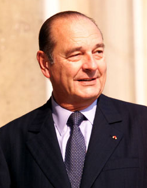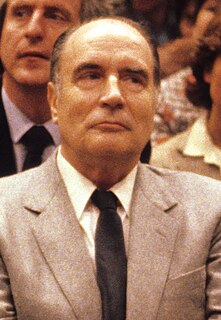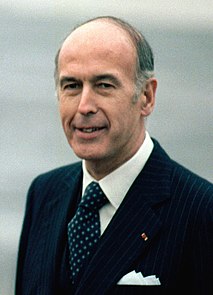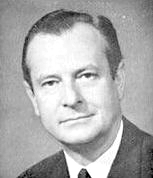| ||||||||||||||||
| ||||||||||||||||
 Results of the second round by department Mitterand: 50–55% 55–60% >60% Chirac: >50% | ||||||||||||||||
| ||||||||||||||||
Presidential elections were held in France on 24 April and 8 May 1988.
Presidential elections in France determine who will serve as the President of France for the next several years.
Contents
In 1981, the Socialist Party leader, François Mitterrand, was elected President of France and the Left won the legislative election. However, in 1986, the right regained a parliamentary majority. President Mitterrand was forced to "cohabit" with a conservative cabinet led by the RPR leader Jacques Chirac. Chirac took responsibility for domestic policy while the President focused on his "reserved domain" – foreign affairs and defense policy. Moreover, several other prominent candidates opposed the two heads of the executive.

The Socialist Party is a social-democratic political party in France and was, for decades, the largest party of the French centre-left. The PS used to be one of the two major political parties in the French Fifth Republic, along with the Republicans. The Socialist Party replaced the earlier French Section of the Workers' International (SFIO) in 1969, and is currently led by First Secretary Olivier Faure. The PS is a member of the Party of European Socialists (PES), the Socialist International (SI) and the Progressive Alliance.
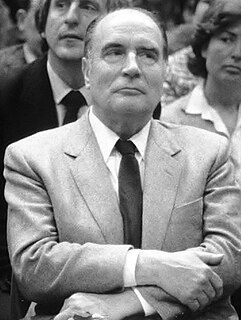
François Maurice Adrien Marie Mitterrand was a French statesman who served as President of France from 1981 to 1995, the longest time in office in French history. As First Secretary of the Socialist Party, he was the first left-wing politician to be elected President of France under the Fifth Republic.
Chirac's cabinet advocated liberal-conservative policies, in abolishing the solidarity tax on wealth and selling some public companies. It was faced with opposition from social movements, supported covertly by President Mitterrand.
The solidarity tax on wealth was an annual direct wealth tax on those in France having assets in excess of €1,300,000. It was one of the Socialist Party's 1981 electoral program's measures, 110 Propositions for France. First named IGF, it was abolished in 1986 by Jacques Chirac's right-wing government, but re-established in 1988 as ISF in slightly different terms after François Mitterrand's re-election.
Meanwhile, the leadership of Chirac over the right was challenged by the former UDF Prime Minister Raymond Barre. Barre gained some popularity by condemning the principle of the "cohabitation", claiming that it is incompatible with the "spirit of the Fifth Republic". He appeared as an alternative to the executive duo. In January 1988, when he announced his candidacy, Chirac was credited with 19.5% in the first round by SOFRES polls institute, against 23% for Barre. But, from the start of February, Chirac benefited from the internal divisions in the UDF, and took the lead among the right-wing candidates.

The Union for French Democracy was a centre-right political party in France. It was founded in 1978 as an electoral alliance to support President Valéry Giscard d'Estaing in order to counterbalance the Gaullist preponderance over the political right in France. This name was chosen due to the title of Giscard d'Estaing's 1976 book, Démocratie Française. The party brought together Christian democrats, liberals and radicals, and non-Gaullist conservatives, and described itself as centrist.

Raymond Octave Joseph Barre was a French centre-right politician and economist. He was a Vice President of the European Commission and Commissioner for Economic and Financial Affairs under three Presidents and later served as Prime Minister under Valéry Giscard d'Estaing from 1976 until 1981. As a candidate for the presidency in 1988, he came in third and was eliminated in the first round. He was born in Saint-Denis, in the French island of Réunion, then still a colony.

The Fifth Republic, France's current republican system of government, was established by Charles de Gaulle under the Constitution of the Fifth Republic on 4 October 1958. The Fifth Republic emerged from the collapse of the Fourth Republic, replacing the former parliamentary republic with a semi-presidential, or dual-executive, system that split powers between a Prime Minister as head of government and a President as head of state. De Gaulle, who was the first French President elected under the Fifth Republic in December 1958, believed in a strong head of state, which he described as embodying l'esprit de la nation.
On the left, the identity of the Socialist candidate was uncertain. Mitterrand said he was not sure he would run, and meanwhile, his internal rival Michel Rocard campaigned for the nomination. The favourite to win the election according to the polls, the incumbent president announced his candidacy at the end of March. He wrote an open letter to the French, where he proposed a moderate programme ("neither nationalisations, nor privatizations") and advocated a "united France" against "the appropriation of the state by a clan", targeting Chirac and the RPR.

Michel Rocard was a French politician and a member of the Socialist Party (PS). He served as Prime Minister under François Mitterrand from 1988 to 1991, during which he created the Revenu minimum d'insertion (RMI), a social minimum welfare program for indigents, and achieved the Matignon Accords regarding the status of New Caledonia. He was a member of the European Parliament, and was strongly involved in European policies until 2009. In 2007, he joined a Commission under the authority of Sarkozy's Minister of Education, Xavier Darcos.
He benefited from the decline of the French Communist Party, represented by André Lajoinie. Lajoinie was faced with competition for the far-left vote by a "reforming Communist", Pierre Juquin and a Trotskyist, Arlette Laguiller. Meanwhile, the Ecologist Antoine Waechter refused to ally the Greens with either the left or the right. On the far-right, the National Front leader, Jean-Marie Le Pen, tried to confirm the FN's good result in the previous legislative election.
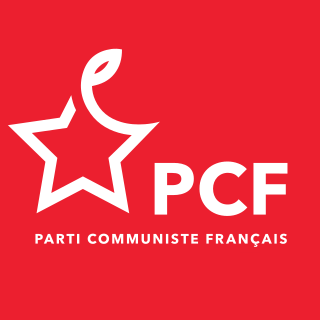
The French Communist Party is a communist party in France.

André Lajoinie is a French politician, and a member of the French Communist Party (PCF).
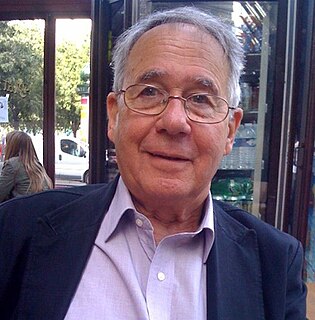
Pierre Juquin is a French communist politician and trade unionist.
The French economy shrugging off the early 1980s recession with 4% growth that year put the economy off the minds of voters as well as popular social programs being implemented, both of which gave Mitterrand the economic argument to achieve a second term despite the fallback in the last legislative election that caused cohabitation.

